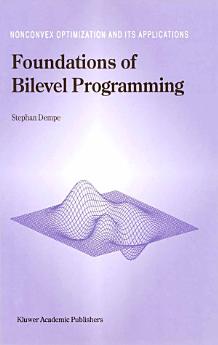Foundations of Bilevel Programming
ডিচে ২০০৫ · Nonconvex Optimization and Its Applications কিতাপ 61 · Springer Science & Business Media
ইবুক
309
পৃষ্ঠা
reportমূল্যাংকন আৰু পৰ্যালোচনা সত্যাপন কৰা হোৱা নাই অধিক জানক
এই ইবুকখনৰ বিষয়ে
Bilevel programming problems are hierarchical optimization problems where the constraints of one problem (the so-called upper level problem) are defined in part by a second parametric optimization problem (the lower level problem). If the lower level problem has a unique optimal solution for all parameter values, this problem is equivalent to a one-level optimization problem having an implicitly defined objective function. Special emphasize in the book is on problems having non-unique lower level optimal solutions, the optimistic (or weak) and the pessimistic (or strong) approaches are discussed. The book starts with the required results in parametric nonlinear optimization. This is followed by the main theoretical results including necessary and sufficient optimality conditions and solution algorithms for bilevel problems. Stationarity conditions can be applied to the lower level problem to transform the optimistic bilevel programming problem into a one-level problem. Properties of the resulting problem are highlighted and its relation to the bilevel problem is investigated. Stability properties, numerical complexity, and problems having additional integrality conditions on the variables are also discussed.
Audience: Applied mathematicians and economists working in optimization, operations research, and economic modelling. Students interested in optimization will also find this book useful.
Audience: Applied mathematicians and economists working in optimization, operations research, and economic modelling. Students interested in optimization will also find this book useful.
এই ইবুকখনক মূল্যাংকন কৰক
আমাক আপোনাৰ মতামত জনাওক।
পঢ়াৰ নির্দেশাৱলী
স্মাৰ্টফ’ন আৰু টেবলেট
Android আৰু iPad/iPhoneৰ বাবে Google Play Books এপটো ইনষ্টল কৰক। ই স্বয়ংক্রিয়ভাৱে আপোনাৰ একাউণ্টৰ সৈতে ছিংক হয় আৰু আপুনি য'তে নাথাকক ত'তেই কোনো অডিঅ'বুক অনলাইন বা অফলাইনত শুনিবলৈ সুবিধা দিয়ে।
লেপটপ আৰু কম্পিউটাৰ
আপুনি কম্পিউটাৰৰ ৱেব ব্রাউজাৰ ব্যৱহাৰ কৰি Google Playত কিনা অডিঅ'বুকসমূহ শুনিব পাৰে।
ই-ৰীডাৰ আৰু অন্য ডিভাইচ
Kobo eReadersৰ দৰে ই-চিয়াঁহীৰ ডিভাইচসমূহত পঢ়িবলৈ, আপুনি এটা ফাইল ডাউনল’ড কৰি সেইটো আপোনাৰ ডিভাইচলৈ স্থানান্তৰণ কৰিব লাগিব। সমৰ্থিত ই-ৰিডাৰলৈ ফাইলটো কেনেকৈ স্থানান্তৰ কৰিব জানিবলৈ সহায় কেন্দ্ৰত থকা সবিশেষ নিৰ্দেশাৱলী চাওক।







